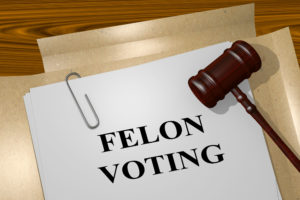
As we talked about on the blog when the bill was originally signed, felons in Minnesota have their voting rights restored upon completion of their incarceration, regardless of other conditions of their sentencing. Previously, felons needed to complete all aspects of their sentence, including probation and parole conditions, before they could see their voting rights restored. Governor Walz signed a bill last March that automatically restored the voting rights upon release from jail, but now the Minnesota Supreme Court will decide whether the new bill will remain.
The appeal made its way up to the state Supreme Court thanks to a challenge by the Minnesota Voters Alliance, which describes itself as an “organization focusing primarily on election integrity, research, voter education, and advocacy.” They originally challenged the legality of the new law back in June, but a state judge dismissed the case last month. The group then decided not to appeal to the Minnesota Court of Appeals, instead opting to take the case directly to the state Supreme Court. Last week, Chief Justice Natalie Hudson issued an order granting the appeal and scheduling oral arguments for April 1.
Interestingly, the Minnesota Supreme Court has already issued a ruling on a similar matter. Back in February of 2023, the state Supreme Court ruled that the previous law, which barred individuals convicted of a felony who had not yet completed parole, probation or other aspects of their sentence from being able to vote, was constitutional. However, the Minnesota legislature adopted the new law under the bill HF 28. A report from Minnesota Reformer suggests that the law change returned the votes of 55,000 Minnesotans who would otherwise not have been eligible to vote.
The decision to restore felon voting rights is a bit of a mixed bag across the United States:
- 38 states automatically restore felon voting rights upon release or at some point after that.
- 22 of those states automatically restore voting rights upon completion of a prison sentence.
- 10 states do not automatically restore voting rights.
- Two states allow convicted felons to vote while they are incarcerated.
It will be interesting to see how the left-leaning Minnesota Supreme Court rules on this matter given their ruling back in 2023. We are always a proponent of second chances, and we know how long probationary conditions can hang with a person even after their release, so hopefully the Minnesota Supreme Court upholds HF 28, but we’ll keep an eye on the proceedings in April.
In the meantime, if you need assistance with a criminal charge or sealing your criminal records, reach out to Avery and the team at Appelman Law Firm today at (952) 224-2277.





